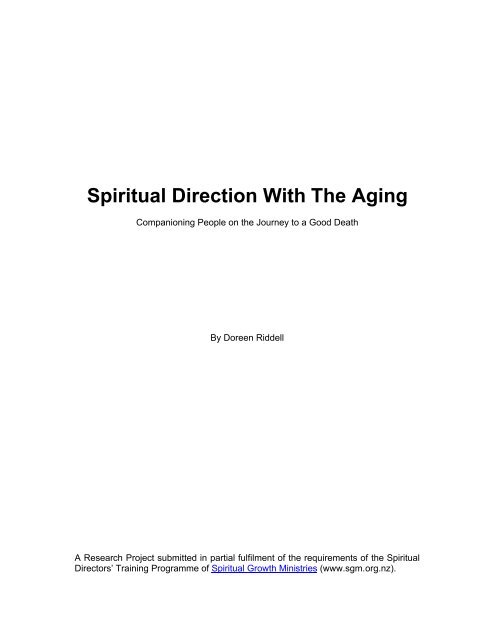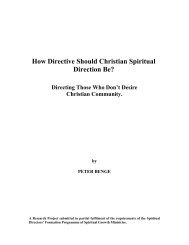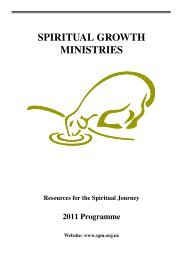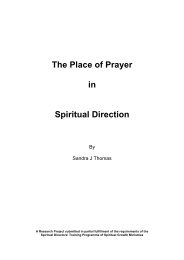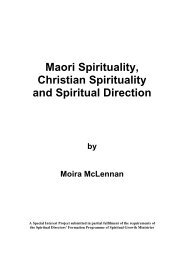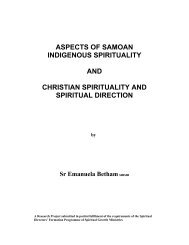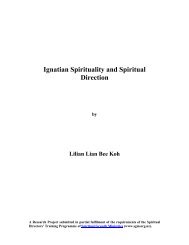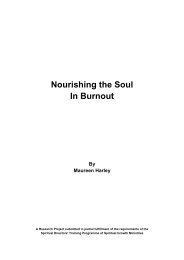Spiritual Direction With The Aging - Spiritual Growth Ministries
Spiritual Direction With The Aging - Spiritual Growth Ministries
Spiritual Direction With The Aging - Spiritual Growth Ministries
Create successful ePaper yourself
Turn your PDF publications into a flip-book with our unique Google optimized e-Paper software.
<strong>Spiritual</strong> <strong>Direction</strong> <strong>With</strong> <strong>The</strong> <strong>Aging</strong><br />
Companioning People on the Journey to a Good Death<br />
By Doreen Riddell<br />
A Research Project submitted in partial fulfilment of the requirements of the <strong>Spiritual</strong><br />
Directors’ Training Programme of <strong>Spiritual</strong> <strong>Growth</strong> <strong>Ministries</strong> (www.sgm.org.nz).
<strong>Spiritual</strong> <strong>Direction</strong> <strong>With</strong> <strong>The</strong> <strong>Aging</strong><br />
Companioning People on the Journey to a Good Death<br />
INTRODUCTION<br />
I have chosen this topic because I feel drawn to working with the aged. I am becoming<br />
increasingly aware of the particular needs of those in late adulthood and late, late adulthood<br />
and I feel more attention needs to be given to their spiritual nurture. I feel concerned for the<br />
frail elderly who may be housebound or institutionalised as well as those who are able to be<br />
much more active. My experience is limited but in the past four months I have been exploring<br />
the model of small groups meeting regularly to share their faith and life experience.<br />
In this paper I have not considered the special needs of those suffering from Alzheimer’s<br />
Disease and other forms of dementia. Ngarie Beehre’s research paper 1 and Eileen Shamy’s<br />
book 2 focus on these needs.<br />
Also I am not writing specifically about death and dying but about companioning people on<br />
the journey towards death through the afternoon and evening of life.<br />
THE NEED TO ACCEPT OUR OWN MORTALITY<br />
To be companions to the aging we first need to know ourselves and to be in touch with our<br />
own aging and our mortality. Nouwen and Gaffney ask<br />
“How can we be fully present to the elderly when we are hiding from our own aging?<br />
…Only as we enter into solidarity with the aging and speak out of common experience<br />
can we help others to discover the freedom of old age” 3<br />
Margaret Guenther adds,<br />
“We must face the fact of our own mortality and befriend it if we are to minister to<br />
those who are facing death. Only then can our ministry be honest, based on the stark<br />
solidity of bed stone … we should be able to hear the questions of life and death, the<br />
‘God-questions’ even when the specialized vocabulary is not present … we can listen<br />
to what is not said and be aware of the great empty places” 4<br />
AGING IS MOVING TOWARDS FULFILMENT<br />
Unfortunately negative feelings and stereotypes of old age are very common.<br />
observes that many people<br />
Fischer<br />
“have accepted the negative images of old age, made them their own and begun to live<br />
out of these images of incompetence and insignificance. <strong>The</strong> task of a spirituality of<br />
1 Beehre, Ngarie. <strong>Spiritual</strong> Care of the Frail Elderly with Alzheimer’s Disease<br />
2 Shamy, Eileen. More than Body, Brain and Breath<br />
3 Nouwen, Henri, J.M. and Gaffney Walter J. <strong>Aging</strong>, p98<br />
4 Guenther, Margaret. Toward Holy Ground, p134<br />
1
aging is to convert the imaginations of both old and young to a new vision of the<br />
future.” 5<br />
d’Apice says that<br />
“One of the gravest fears about the losses of these later years is that they will include a<br />
serious decline in intellectual ability and a deprivation of mental powers. But this is<br />
rarely the case”. 6<br />
It is important to distinguish the physical aging process from intellectual development,<br />
creative capacity, social participation and spiritual maturity. In his letter to the Corinthians<br />
Paul makes this distinction,<br />
“So we do not lose heart. Even though our outer nature is wasting away, our inner<br />
nature is being renewed day by day.” 7<br />
<strong>The</strong>se words of the late Rabbi Abraham Heschel point to old age as a time of rich<br />
opportunities for personal growth:<br />
“<strong>The</strong> years of old age may enable us to attain the high values we failed to sense, the<br />
insights we have missed, the wisdom we ignored. <strong>The</strong>y are indeed formative years,<br />
rich in possibilities to unlearn the follies of a lifetime, to see through inbred selfdeceptions,<br />
to deepen understanding and compassion, to widen the horizon of honesty,<br />
to refine the sense of fairness.” 8<br />
It is most important to be mindful of the rich possibilities for personal growth in the second<br />
half of life as we relate to the aging. Above all it is the potential for spiritual awareness, of an<br />
ever-deepening relationship with God that we are most concerned with. I believe this<br />
relationship is fully realised in death.<br />
I believe death is not an end in itself, not a passing into nothingness, but rather a homecoming,<br />
a return to the One from whom we came. Paul Tournier describes the wonder of our<br />
personhood, “<strong>The</strong> person is a mysterious reality which goes beyond existence at both ends,<br />
transcending both birth and death.” 9<br />
Lord Coggan expresses it more personally:<br />
“It is said of Jesus Christ that he knew that ‘he came from God and was going back to<br />
God’. Between these two poles his life was lived. He came from God; therefore God<br />
had a purpose which he must fulfil. He was going back to God; therefore life was<br />
moving towards a goal, a climax … Life seen like that has a dignity and a significance<br />
all its own.” 10<br />
It is this inner conviction that I come from God and that ultimately I will return to God that<br />
gives meaning and purpose to our lives. This is the foundation for our confidence and hope.<br />
5 Fischer, Kathleen. Winter Grace, P15<br />
6 d’Apice, Mary. Noon to Nightfall, p177<br />
7 <strong>The</strong> Holy Bible, NRSV. 2 Corinthians 4:16<br />
8 Quoted by Fischer, op.cit., p166<br />
9 Tournier, Paul. Learning to Grow Old, p233<br />
10 Quoted by Burton-Jones, Julia. Now and Forever, p110<br />
2
Our life is part of God’s loving purpose and our ultimate destiny is with God. <strong>Aging</strong> is part of<br />
our journey and death a natural process through which we all must pass to return home to<br />
God. This conviction runs through the Scriptures like a golden chain. 11<br />
A GOOD DEATH<br />
I suggest that a good death means to die at peace – at peace with God, ourselves and others.<br />
Above all to be assured of the accepting unconditional love of God, to be confident in God’s<br />
great mercy. June Higham says, “<strong>The</strong> main thing is to know that God loves you, whoever you<br />
are and wherever you’ve been.” 12 This leads to the peaceful assurance and anticipation of<br />
death that Margaret Dunn speaks of, “that whatever is next is good, it is to be anticipated, not<br />
feared.” 13<br />
This confidence and trust was expressed most beautifully by an Indian friend who knew death<br />
was very near. When I came to her bedside she said, “<strong>The</strong> Heavenly Father is calling me<br />
home”.<br />
Lord Soper expressed his faith<br />
“I find my comfort not in any precise plan of eternity, but in the confidence that the<br />
God of creation and of providence revealed by Jesus will be ‘there’, just as I believe he<br />
is ‘here’, and I shall be a member of his family. I will be content with that.” 14<br />
Both June Higham and Margaret Dunn mentioned that it is important for people to be in touch<br />
with their relationship with God. June spoke of God as ‘friend and companion’, my Indian<br />
friend knew God as “Heavenly Father”. People know God in different ways and that is valid<br />
– it is the sense of a loving trustworthy relationship that is important.<br />
Nouwen stresses the importance of being aware that we are sons and daughters of God and<br />
having that confidence and trust that enables us to put ourselves in God’s hands – to let go and<br />
take the step of faith through the doorway to God. He writes:<br />
“Once we have come to the deep inner knowledge – a knowledge more of the heart<br />
than the mind – that we are born out of love and will die into love, that every part of<br />
our being is deeply rooted in love and that this love is our true Father and Mother, then<br />
all forms of evil, illness and death lose their final power over us and become painful<br />
but also hopeful reminders of our true divine childhood.” 15<br />
<strong>The</strong> strong affirmation of the apostle Paul that nothing, not even death, can separate us from<br />
the love of God in Christ Jesus our Lord 16 expresses the confidence and hope that we would<br />
like to share with others.<br />
11 <strong>The</strong> Holy Bible. NRSV. Genesis 1:27, Psalm 22:9, Psalm 139:13, Isaiah 43:1, Isaiah 46:3-4, John<br />
14:2-3<br />
12 June Higham, Chaplain, Eventide Home, Hamilton<br />
13 Margaret Dunn, <strong>Spiritual</strong> Director, Albany<br />
14 Burton-Jones, op. cit., p115<br />
15 Nouwen, Henri, J.M. Our Greatest Gift, p33<br />
16 <strong>The</strong> Holy Bible, NRSV. Romans 8:38<br />
3
ASPECTS OF SPIRITUALITY<br />
I am deeply indebted to the work of Mary d’Apice, Kathleen Fischer and Margaret Guenther<br />
as well as Henri Nouwen and Nouwen and Walter Gaffney for insights into a spirituality of<br />
aging. I feel Kathleen Fischer expresses the paradox of the Christian faith very clearly.<br />
“From the perspective of faith, the later years provide the most intense and vivid<br />
revelation of the paradox at the heart of the Christian Gospel : that in losing our lives<br />
we somehow find them; that loss can be gain, and weakness, strength; that death is<br />
the path to life.” 17<br />
A Contemplative Stance<br />
Underlying all that happens in the journey through the years of late adulthood and late, late<br />
adulthood is the movement from doing to being. This may be experienced very abruptly as<br />
with retirement from full time work or a sudden severe illness that brings permanent loss or<br />
diminishment or it may occur gradually as our body slows and other changes take place in our<br />
lives.<br />
This shift in emphasis from doing to being is an opportunity to develop a more contemplative<br />
stance to life and “to meet each person and situation with greater care and attentiveness.” 18 It<br />
is a valuable opportunity to deepen and strengthen our relationships with God, with others,<br />
with creation and with our deepest selves. At this stage of life it is most helpful to continue to<br />
evolve, and maintain the patterns and structures that support these relationships.<br />
Fischer writes about prayer in the context of the loneliness that many experience in old age:<br />
loneliness that may result either from the absence of interaction with others or from the<br />
absence of activity.<br />
“<strong>The</strong> pain of loneliness can be an invitation to increase our dependence on God. At its<br />
deepest level all loneliness reflects our common experience that no created goods fully<br />
answer our inner yearnings; loneliness is rooted in a longing for God. It becomes<br />
solitude when the voice of God can be heard in its stillness. Contemplation can fill the<br />
empty silence with the reality of God’s presence.” 19<br />
Fischer offers very helpful suggestions regarding centering prayer or prayer of the heart and<br />
praying with Scripture in the chapter “A Heart of Wisdom”. 20<br />
<strong>The</strong> Prayer Of Reminiscence<br />
One of the most important tasks of aging is to review the whole of our lives and deal with any<br />
unresolved issues. This is the time to truly find peace with God, ourselves and others as we<br />
come to an ever deepening understanding of God’s great mercy and unconditional love which<br />
does not depend at all on either our failures or successes.<br />
17 Fischer, op. cit., p19<br />
18 Ibid, p26<br />
19 Ibid, p32<br />
20 Ibid, p25-40<br />
4
This is a time to offer our feelings of regret and failure to God and know that we are forgiven.<br />
It is a time to offer hurts and resentments and find the healing that enables us to let them go.<br />
A time to seek reconciliation with others and also to forgive others for what they have done to<br />
us. It is also a time to accept ourselves and our life journey, the choices we have made, what<br />
we have done and not done. It is a time to offer our intentions and deepest desires to God and<br />
to trust that our lives are being woven into God’s good purposes.<br />
Part of the looking back will be the recalling of pleasant occasions in our lives and this can<br />
bring a sense of wellbeing and of deep satisfaction. We can be encouraged and affirmed by<br />
recalling happy days and times when we received love and respect and by remembering the<br />
many different ways in which we have contributed to the lives of others.<br />
d’Apice writes very beautifully about how looking back on the journey becomes a prayer of<br />
reminiscence. She gives the example of the two men walking to Emmaus and how Jesus<br />
came to them in their sadness and confusion. Jesus explained to them the meaning and<br />
significance of his life, death and resurrection as revealed in the Hebrew scriptures. d’Apice<br />
says that the aged also need to invite Jesus into their memories of the past. “It is he who will<br />
open up the scripture of their lives, will throw light into the dark recesses of the past, will<br />
show the gains which first appeared as losses.” 21<br />
d’Apice points out that remembering the past in this contemplative way leads to a deeper<br />
understanding of ourselves. We begin to see our life as a whole and find meaning and<br />
recognise God’s mercy. Our awareness of God at work within us and of our role in being part<br />
of God’s purpose is deepened.<br />
In her book, Winter Grace, Kathleen Fischer has a very helpful chapter on memories in which<br />
she discusses four aspects of the religious meaning of memory: memory and religious<br />
identity, the joyful mysteries of our lives, the healing of memories and ritual as a way to<br />
remember. 22<br />
Fischer emphasises the importance of a faith perspective if reviewing our lives is to result in<br />
integrity and peace and not in despair and disgust. Through remembering God’s presence and<br />
provision in the past new courage and hope are kindled. I feel this is a very important aspect<br />
of remembering. As Fischer says<br />
“Remembering is the biblical way of appropriating the past and the basis of religious<br />
identity. At each key juncture in her life, Israel retold the story of what God had done<br />
for her, how God had remained faithful in the midst of her infidelities, how God’s<br />
presence had sustained her in times of trial. By remembering, she made God’s love<br />
present again with power. Out of these memories arose new courage and hope that<br />
God’s promises would again be fulfilled. Like Israel we also tell and retell our stories,<br />
since they have levels of meaning that cannot be completely captured in a single<br />
telling.” 23<br />
21 d’Apice, op. cit., p240-241<br />
22 Fischer, op. cit., p45-60<br />
23 Fischer, op. cit., p49<br />
5
Darkness<br />
Darkness may be experienced by the aging in many different ways. Retirement may bring a<br />
loss of identity and self worth and a sense of meaninglessness. Because of the tendency of<br />
society to segregate the aging there may be the darkness of isolation. <strong>The</strong>re is the darkness of<br />
grief and isolation with the gradual loss of loved ones. Associated with this may be the<br />
feeling of a loss of identity with no one close to us who really knows our past.<br />
Pain and suffering may bring deep inner questioning and a sense of darkness. <strong>The</strong>re may be<br />
the gradual stripping away of energy, mobility, space and personal possessions as we grow<br />
older and frailer and perhaps are even limited to our room or a hospital bed.<br />
Despair and a sense of abandonment may also be experienced. I suspect this may come at a<br />
time of great suffering or when death is near. Reflecting on the suffering and death of Jesus<br />
may help at such a time. Jesus experienced desolation and a sense of abandonment but finally<br />
accepted death in a trustful commitment, “Father, into your hands I commend my spirit.” 24<br />
<strong>The</strong>re is also the darkness that may be experienced as the “perceived absence of God”. Kerrie<br />
Hyde of Canberra has applied the Dark Night poem of St John of the Cross to the experience<br />
of aging and suggests that “Our task as we age is to negotiate these dark nights so that ageing<br />
draws us into a ‘third dark night’, a time before dawn where we are free and ready to find rest<br />
in divine love”. 25<br />
LISTENING TO THE STORIES<br />
Barry and Connolly describe Christian spiritual direction as “help given by one Christian to<br />
another which enables that person to pay attention to God’s personal communication to him or<br />
her, to respond to this personally communicating God, to grow in intimacy with this God, and<br />
to live out the consequences of the relationship”. 26<br />
John North commented recently, “<strong>Spiritual</strong> direction is really about one person telling their<br />
story, reflecting on it and seeing that it is valuable”. 27 It is through the reminiscing and the<br />
sharing of stories from a contemplative stance that we begin to be aware of someone beyond<br />
who loves us unconditionally and in some mysterious way is touching our hearts and minds<br />
and who gives a sense of purpose and meaningfulness to our lives.<br />
I suggest that as we work with the aging in formal and informal ways of spiritual direction it<br />
is most important to encourage ‘remembering’, looking back and sharing memories in a<br />
contemplative way and encouraging reflection on such questions as Where was God? What<br />
was happening? What is God saying to me now? What is the invitation?<br />
Our role is that of listener – “patient, attentive, receptive”. 28 Guenther says, “We can<br />
bring the gift of time and patience, listening to the stories and acknowledging by our<br />
compassionate presence that there are no quick fixes or easy answers”. 29 To that I would add<br />
24 <strong>The</strong> Holy Bible, NRSV. Luke 23:46<br />
25 Hide, Kerrie. <strong>Spiritual</strong> <strong>Growth</strong> <strong>Ministries</strong> Newsletter Winter 2000, p15<br />
26 Barry, William A. and Connolly, William J. <strong>The</strong> Practice of <strong>Spiritual</strong> <strong>Direction</strong>, p8<br />
27 John North, Baptist Minister and <strong>Spiritual</strong> Director, Auckland<br />
28 Guenther, op. cit., p135<br />
29 Ibid., p137<br />
6
we can gently seek to create and provide ways and opportunities for the aged to grow in<br />
awareness of the presence of God.<br />
ALTERNATIVE MODELS OF SPIRITUAL DIRECTION<br />
Very few older people from 65 to 70 years upwards receive spiritual direction in the<br />
traditional pattern of a regular one to one monthly meeting with a director. <strong>With</strong> increased<br />
awareness of opportunities for spiritual growth and people living longer and enjoying better<br />
health it is likely that the number of people receiving spiritual direction will increase but even<br />
so probably only a very small proportion of the Christian community would be touched.<br />
I have been exploring other models of using spiritual direction ways to help people grow in<br />
their awareness of a personal relationship with God and deepen that relationship. In<br />
particular, I have considered the value of small groups.<br />
I have found the work of Tilden Edwards and Gerald May very useful. <strong>The</strong>se men have<br />
worked together at the Shalem Institute for <strong>Spiritual</strong> Formation in Washington. Gerald May’s<br />
book, Pilgrimage Home, summarises their work and learnings of the Shalem Institute up to<br />
the time of publication. 30 Although May is specifically writing about the conduct of<br />
contemplative practice in groups whereas I have been thinking more of the value of<br />
‘reminiscing’ and working through the ‘stories’ I found much useful material for my own<br />
personal growth and for working in spiritually formative ways with small groups. Edward’s<br />
Chapter 7 on Group <strong>Direction</strong> was also very helpful. 31<br />
SMALL GROUP MODELS<br />
1. <strong>The</strong> Good Companions<br />
After consultation with our clergy team I invited older people in our congregation who attend<br />
the mid-week communion service to join a small group to encourage one another by sharing<br />
their experiences of how God touched their lives over the years. My prayer was that by<br />
sharing in this way their relationship with God would strengthen and deepen. I named the<br />
group <strong>The</strong> Good Companions.<br />
Initially we had nine weekly meetings after the mid-week communion service and morning<br />
tea. We met in the church lounge. Due to certain constraints we sometimes had only 30<br />
minutes together but I feel 45-60 minutes would be best. After the 8 th meeting the group<br />
answered a short questionnaire.<br />
All seven people who attended four or more meetings asked for the group to continue but<br />
fortnightly or monthly. We now meet twice a month. Patterns are evolving. At present I<br />
begin with a short reading form the scriptures or from a suitable book and this flows on to<br />
sharing experiences and feelings. We close with a brief prayer or affirmation and say the<br />
grace together. This experience has convinced me that such groups can be very helpful in<br />
increasing people’s awareness of God’s presence and grace and in deepening their<br />
relationship with God.<br />
30 May, Gerald G. Pilgrimage Home<br />
31 Edwards, T. <strong>Spiritual</strong> Friend<br />
7
2. <strong>The</strong> Discussion Group at Wilson Carlisle Home<br />
<strong>The</strong> Rev Lesley Hyde, Chaplain at the Anglican Social Services Wilson-Carlisle Home in<br />
Hamilton, offers a fortnightly discussion group for residents. <strong>The</strong>y meet after morning tea for<br />
about 45 minutes.<br />
Recently I was privileged to be present at a meeting attended by nine residents comfortably<br />
seated in a sunny corner of the recreation room. Hyde has been reading the book, Soul<br />
Survivor by Paul Hawker with the group. After the reading, skilful questions and comments<br />
led people on to tell their stories. Some shared personal insights and experiences of God<br />
protecting and transforming. I noticed that the group seemed very open, attentive and relaxed.<br />
Most people contributed one way or another, perhaps simply a word of affirmation. Hyde<br />
commented that the way people do begin to talk is quite wonderful.<br />
3. A Meditation Group at Windermere<br />
<strong>The</strong> Rev Isobel Probert described a group she led at the Presbyterian Support Home at<br />
Windermere in Christchurch in 1982 as part of her exploration of the spiritual needs of older<br />
people.<br />
Six or seven people in their late 70’s and 80’s contracted to attend the series of six weekly<br />
group meetings for the residents of the flats at Windermere. Isobel called the series Life…<br />
Growing and Discussing and through meditation and journaling led the group to reflect on the<br />
past, present and future. Some of the group had no specific Christian connections or<br />
experience of meditation and prayer. Isobel sought to develop an awareness of being loved,<br />
cared for and valued. She waited for group members to introduce the God dimension and this<br />
occurred naturally. Isobel found that the group responded amazingly well and people were<br />
helped.<br />
4. Quiet Mornings<br />
<strong>The</strong> Rev Jean Cotter offers monthly quiet mornings at her home in Hamilton from 9.30am to<br />
12.30pm. <strong>The</strong> usual pattern is a gathering for the introduction to the theme, music as a<br />
background for reflection, moving on into silence and the opportunity to find a space alone for<br />
reflection and finally gathering again to share experiences and insights.<br />
OTHER MODELS<br />
1. Pastoral Care<br />
<strong>The</strong> majority of aging people live in the community. Many live alone or with an aging spouse<br />
or partner. However, although they have been enabled to live in their own homes through<br />
provision of special care and help, they may not be able to go out independently to attend<br />
worship services or to attend groups and other activities. <strong>The</strong> provision of adequate pastoral<br />
care for this rapidly increasing group of people is very important.<br />
<strong>Spiritual</strong> direction skills can be used in just being present and giving time, in listening<br />
attentively and giving gentle encouragement to share their stories and to affirm and explore<br />
their awareness of their relationship with God. Andrew Dunn tells of the older woman in his<br />
parish who was encouraged to keep a journal and whenever he visited she brought out her<br />
journal and shared her experiences and insights over a cup of tea. 32<br />
32 Andrew Dunn, <strong>Spiritual</strong> Director, Albany<br />
8
2. Alternative Worship Services<br />
Some churches provide a service especially designed for older people who prefer a more<br />
traditional and quieter service with well loved hymns and a familiar version of the Scriptures.<br />
While such services do meet a real need the importance of intergenerational contact and<br />
worship should be kept in mind.<br />
“Grandparents, parents, children, and grandchildren – they all make the whole of our<br />
lifecycle visible and tangible to us at every moment of our lives. <strong>The</strong>y offer a healing<br />
expectation as well as a healing memory.” 33<br />
3. Special Events<br />
I attended a retreat with an 80 year old and we met again at a workshop on contemplative<br />
prayer. <strong>The</strong>re is no reason to think that older people will not enjoy or benefit from quiet days,<br />
retreats, workshops and so on and as long as their health permits I believe they should be<br />
encouraged to attend such events.<br />
33 Nouwen and Gaffney, op. cit., p117<br />
9
BIBLIOGRAPHY<br />
BOOKS<br />
Barry, William A. & Connolly, William J. <strong>The</strong> Practice of <strong>Spiritual</strong> <strong>Direction</strong>. Harper: San<br />
Francisco, 1982.<br />
Burton-Jones, Julia. Now and Forever. Triangle: London, 1997.<br />
d’Apice, Mary. Noon to Nightfall. Dove: Australia, 1995.<br />
Edwards, Tilden. <strong>Spiritual</strong> Friend. Paulist Press: New York, 1980.<br />
Fischer, Kathleen. Winter Grace. Upper Room Books: Nashville, 1998.<br />
Guenther, Margaret. Toward Holy Ground. Cowley Publications: Boston, 1995.<br />
Kubler-Ross, Elisabeth. <strong>The</strong> Wheel of Life. Bantam Press: London, 1997.<br />
May, Gerald G. Pilgrimage Home. Paulist Press: New York, 1979.<br />
Nouwen, Henri J.M. Our Greatest Gift. Hodder & Stoughton: London, 1994.<br />
Nouwen, Henri J.M. & Gaffney, Walter J. <strong>Aging</strong>. Image Books, Doubleday: New York,<br />
1976.<br />
Peck, M. Scott. Denial of the Soul. Simon and Schuster: London, 1997.<br />
Seymour, Robert E. <strong>Aging</strong> <strong>With</strong>out Apology. Judson Press: Valley Forge, USA, 1995.<br />
Shamy, Eileen. More than Body, Brain and Breath. ColCom Press: New Zealand, 1997.<br />
Tournier, Paul. Learning to Grow Old. SCM Press: London, 1972.<br />
PAPERS<br />
Beehre, Ngarie. <strong>Spiritual</strong> Care of the Frail Elderly with Alzheimer’s Disease. <strong>Spiritual</strong><br />
<strong>Growth</strong> <strong>Ministries</strong>: New Zealand 1999.<br />
Hide, Kerrie. So <strong>The</strong> Darkness Shall Be <strong>The</strong> Light. <strong>Spiritual</strong> <strong>Growth</strong> <strong>Ministries</strong> Newsletter:<br />
Auckland, Winter 2000.<br />
INTERVIEWS<br />
Margaret Dunn, <strong>Spiritual</strong> Director<br />
<strong>The</strong> Rev. Loris Eyre, Minister, Anglican Church<br />
June Higham, Chaplain, Rest Home<br />
<strong>The</strong> Rev Lesley Hyde, Minister, Anglican Church<br />
<strong>The</strong> Rev Isobel Probert, Minister, Presbyterian Church<br />
10


